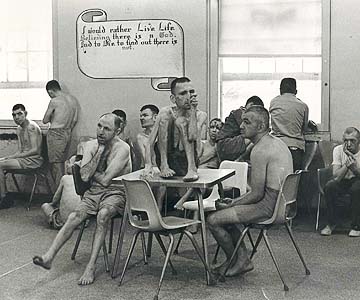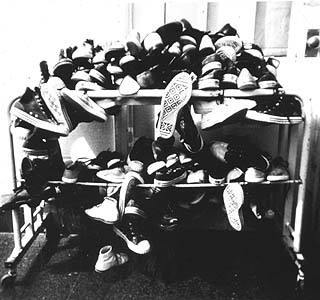Public Hostage: Public Ransom – Inside Institutional America
Chapter Seven: People Become Things – Mass Reduction
We live in a cultural system where things are more highly valued than people. Vitality is gauged by what we possess: home, auto, clothes, family, friends, TV, knowledge, money. We are conditioned to experience our own value by owning things or having the capacity to acquire things. If we have a life, a dynamic, it has been interpreted as this capacity to consume and surround ourselves with objects.
It is an ordeal to refrain from consuming things, let alone to experience ourselves and our relations with other people as basically powerful and productive. It is no wonder that, in a world where things are king and people are the go-betweens, people are easily experienced and interpreted as things, statistics, numbers.
Some things have more apparent social value than others, and so some people have more value. Those people who can retain an image of individuality--a name, a special identity—can temporarily escape being reduced to subhuman status. But once the reduction of that identity is begun, an image of being less than human is fashioned, and the rush toward disappearance into a bunch of things gains momentum.
In order for the institution to carry on its operation, it is vital that the individual be submerged and become nameless, without identity. The alchemy of dehumanization from person to thing occurs.


Thus, the infliction of violence is no longer experienced as violence, brutality, scorn, regimentation. Such terms are all meaningless, for how can one be brutal to a shoe or a toothbrush? One is compelled to expect stacking, piling, ordering, uniformity, among large numbers of things.
Is that not what we have been taught? Keep our things together? Put them away at night? Classify and group things according to similar properties?
People are only too ready to make things of other people. People with power do this routinely. The very idea of parity and respect among people—all people—is a contradiction to those whose self-definition is one of superiority. In fact, people with the most power in our society count their power not by money but by the legions of others in their control, others whose control requires their reduction to the mass — anonymity, namelessness.
One must actively fight the alchemy whereby the most powerless individuals, those in the institutions of our country, are reduced to things, talked about as things, perceived as things, arranged as things, cast off as things, kept as income property by people—by the few who understand that their own power derives from their ability to practice this alchemy over blocs of fellow citizens. It's stunning how easily we can become things ourselves when, in our own minds, we allow the reduction to occur to others.
Infirmity, powerlessness, the ability to define oneself as valued, are the most real yet fragile facts of life…
Unless…
Unless we dare to change ourselves along with those values and structures that make things more real than people.
Is that too much to ask—that we save ourselves from certain destruction by public institutions?
